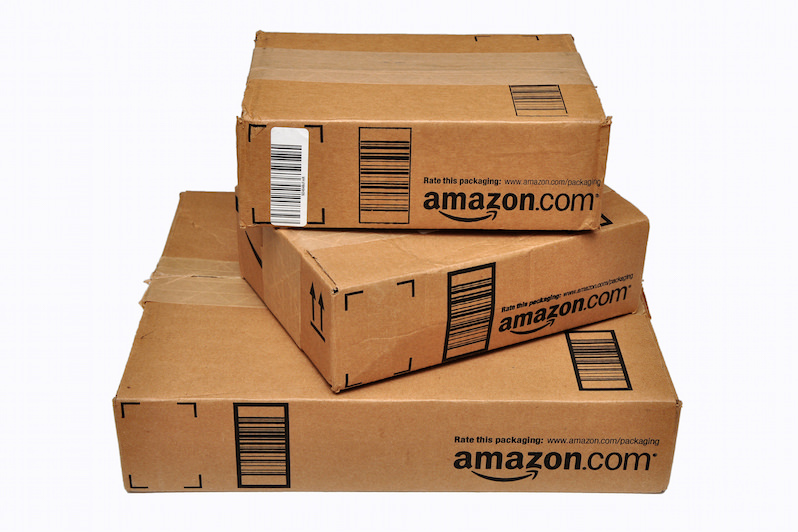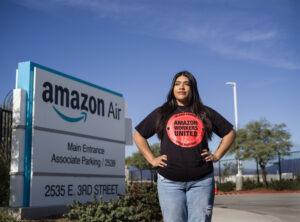Amazon Offers Free Delivery of Workplace Hell
Both low-paid and elite workers at Amazon and other companies are being pushed to their limits. Without unions to protect them from the brutality of corporate demands, workers are at the mercy of Jeff Bezos and his ilk. Joe Ravi / Shutterstock
Joe Ravi / Shutterstock
A lengthy exposé by The New York Times about Amazon’s work environment recently revealed the depths to which American workplace culture has plummeted, particularly for white-collar workers. Journalists Jodi Kantor and David Streitfeld interviewed more than 100 current and former Amazon employees and concluded, “The company is conducting an experiment in how far it can push white-collar workers to get them to achieve its ever-expanding ambitions.”
“Amazonians,” as employees are referred to, are constantly monitored by their higher-ups and their time micromanaged ruthlessly. They are encouraged to engage in a brutal “Hunger Games”-style practice of snitching on one another to management. Those struggling with unexpected illnesses, caregiving needs or even childbirth are often pushed out for supposedly not being committed enough to their jobs. Regular performance evaluations are designed to weed out employees who don’t meet Amazon “standards,” and reasonable interpretations of work-life balance are frowned upon. One former worker told the Times, “Amazon is where overachievers go to feel bad about themselves.”
But it’s not just office workers at Amazon. The company’s poor treatment of its lower-paid warehouse workers has been well documented. Author Simon Head, in his 2014 book, “Mindless: Smarter Machines Are Making Dumber Humans,” wrote, “Amazon’s system of employee monitoring is the most oppressive I have ever come across,” and its management model is based on “pushing up employee productivity while keeping hourly wages at or near poverty levels.” Head described a level of brutality analogous to the barbarism of upper-level jobs that The New York Times found later.
Head told me in a recent interview on “Uprising” that what the Times described at Amazon “crossed serious moral frontiers.” He added, “There is a broad ethical question: Is it justified in pushing human beings and undermining their dignity for such utterly trivial reasons … as getting a doll to someone in New York City 23 minutes faster?” Head went as far as to compare Amazon’s Anytime Feedback Tool, which managers use to bad-mouth their colleagues, to the methods of the Stasi, the East German secret police.
In July, Amazon surpassed Wal-Mart as the world’s largest retailer. The company has thrived by espousing the worst workplace practices for both its blue- and white-collar workers. This is no accident. American capitalism has glorified overwork in the name of competition and at the expense of worker well-being.
It is safe to say that Amazon has been built on the ruin of unions. “The function of labor unions since the capitalist brutalism of the 19th century,” said Head, “is to stop this sort of thing from happening, to put limits on the predatory nature of capitalism.”
But it’s not just Amazon that has warped American work ethics. A majority of U.S. workers are steeped in it. For millions of Americans, the summer of 2015 came and has almost gone without a vacation. A new survey found that 56 percent—more than 135 million people—did not take a vacation over the past year. As defined by the surveyor, Allianz Global Assistance, a vacation is at least one week long, and at least 100 miles from home. Sadly, the number of non-vacationers was 10 percent higher than the year before, breaking records for how many Americans are either denied—or are denying themselves—a vacation.
The U.S. is one of only a handful of countries in the industrialized world that does not have a mandatory paid vacation requirement. Because employers are not bound by law, many simply don’t offer paid vacation, especially to lower-income workers. But for higher-paid workers, vacations are used as perks to “attract talent.” The problem is that at Amazon and other big companies, those who have paid vacation benefits are increasingly less likely to use them for fear of appearing less productive.
The trend is similar trend for parental leave. An in-depth report by Sharon Lerner at In These Times magazine profiled several mothers and described their heartbreaking struggles to balance childbirth and work. Lerner cited the shocking statistic that 1 in 4 new mothers who work returned to their jobs within two weeks of giving birth. While blue-collar working mothers have less access to paid maternal leave, white-collar moms risk being fired for taking advantage of their parental leave policy.Netflix recently made waves when it announced that it would offer employees up to a whole year of paid parental leave after the birth of a child. But closer examination revealed a class divide within the company: Lower-paid workers in the DVD distribution centers are not eligible for the generous-sounding policy; it is extended only to higher-paid employees within the streaming services section of Netflix. As is the case at Amazon, it is likely that higher-paid employees are leery of taking full advantage of the perk, lest they appear unenthusiastic about their work and find themselves out of a job altogether.
And yet the notion that American workers are lazy and lack a good work ethic continues to prevail, as this 2012 USA Today article asserted. The report cites an author who derides younger workers in particular of wanting to “get the job done, then put it behind them and enjoy life.” Imagine wanting to enjoy life instead of pouring your soul into a job! “The world of business doesn’t operate on what’s convenient for you and what fits into your schedule and your particular expectation,” one employer told the newspaper. Apparently, the world of business operates on what is convenient for profit margins, rather than for workers.
In fact, Americans are working harder than ever. A study by the Economic Policy Institute (EPI) in January found that “[f]rom 1973 to 2013, hourly compensation of a typical (production/nonsupervisory) worker rose just 9 percent while productivity increased 74 percent.” In fact, if wages had kept up with productively, the U.S. minimum wage would currently be $18 an hour! Not surprisingly, the EPI also found that a “[d]ecline in union membership mirrors income gains of top 10%.”
Amazon founder Jeff Bezos, whose work ethic seems to drive how his company treats its workers, responded to The New York Times article by commenting that it read like a description of “a soulless, dystopian workplace where no fun is had and no laughter heard.” Bezos, one of the world’s richest men, emphasized fun and laughter as hallmarks of a good workplace. But in fact, justice, compassion and humanity are what is truly missing from today’s workplaces.
American workers are sacrificing their lives, happiness and humanity to fulfill Bezos’ inhumane ideal of workplace ethics. And those are the privileged ones among us. Lower-income workers are simply pushed as hard as possible, with little or no time off, poor conditions, little job security or quality and dismal pay.
It is possible that people are starting to dismiss the notion that hard work for little gain is not in their interest. Or perhaps they have simply hit the limit of their productivity. Either way, The Wall Street Journal recently complained that “After surging in the early days of the economic recovery, worker productivity has slowed to a pace last consistently recorded in the early 1980s.” Bizarrely, the newspaper went on to blame low productivity for low wages, instead of the other way around: “[T]he lack of stronger productivity gains is likely one factor restraining pay increases.”
But growing worker productivity is exactly the opposite of what we need today. Well-paid Americans are living to work instead of working to live. Meanwhile, poor Americans, including those who are unemployed, cannot work nor really live. If life is not the point, what is?
Your support is crucial…With an uncertain future and a new administration casting doubt on press freedoms, the danger is clear: The truth is at risk.
Now is the time to give. Your tax-deductible support allows us to dig deeper, delivering fearless investigative reporting and analysis that exposes what’s really happening — without compromise.
Stand with our courageous journalists. Donate today to protect a free press, uphold democracy and unearth untold stories.






You need to be a supporter to comment.
There are currently no responses to this article.
Be the first to respond.